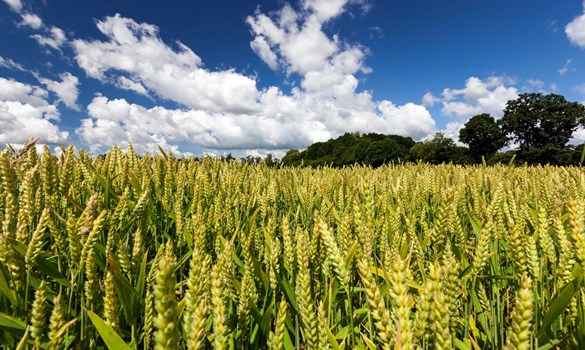Agronomists' Conference 2021
Webinar recording
AHDB research provides agronomists with a toolbox of practical strategies to use across the rotation.
The one-day event showcased the latest integrated pest management (IPM) research for the cereals and oilseeds industry.
Visit our home page for agronomists
Programme and video links
08:30 Registration, refreshments and exhibitions
09:00 Chair’s welcome
Richard Meredith, Head of Arable Knowledge Exchange, AHDB
Dr Emily Pope, Senior Knowledge Transfer Manager (Cereals & Oilseeds), AHDB
09:10 Welcome from Cereals & Oilseed Sector Strategy Director
Martin Grantley-Smith, Sector Strategy Director, AHDB
09:20 Session 1
Integrated pest management (IPM)
What it is IPM? How can it be measured? How should it be encouraged? This presentation explored the uptake of IPM in UK cropping systems. It also looked at the barriers to adoption and how economic incentives may be required to accelerate its uptake.
Integrated pest management (IPM) in UK crop production (video)
A review of preventative measures
Dr Neil Paveley, Head of Crop Protection, ADAS
What does the future of IPM look like, how do we measure it and does it pay for business and the environment?
Phil Jarvis, Chairman, VI
10:05 Session 2
The role of soil health
A structured way to monitor changes to soil health is being delivered by a five-year research programme. As part of AHDB’s GREATsoils work, this presentation investigated how soil health can be measured and improved across the arable rotation. In particular, the presentations explore the ‘soil health scorecard’ and how it can be used to help guide management decisions.
How to monitor and manage in-field soil health (video)
Understanding the drivers of soil health
Dr Anne Bhogal, Senior Research Scientist, ADAS
Can I build farm resilience through soil health?
Dr Elizabeth Stockdale, Head of Farming Systems Research, NIAB
11:15 Session 3
Fungicides and disease management
Our fungicide performance work provides high-quality, independent information on the efficacy of fungicides against key diseases in wheat, barley and oilseed rape. Hear the latest results and find out about fungicide resistance concerns in septoria tritici. This session also explored how non-chemical options can help reduce the requirement for fungicides, as part of integrated pest management (IPM).
Fungicide performance and disease management in wheat, barley and oilseed rape (video)
Fungicide performance
Jonathan Blake, Technical Director of Crop Protection, ADAS
Considerations for disease control
Chloe Morgan, Arable Crop Pathologist, ADAS
12:30 Session 4
Varieties
Crop genetics are the foundation of integrated pest management (IPM) strategies. Discover how the AHDB Recommended Lists (RL) helps farmers control major cereal diseases, such as septoria tritici, yellow rust and Barley yellow dwarf virus. This session also explored the role of varietal blends, low-input cropping systems and the influence of climate change.
Varietal developments in cereals (video)
RL update
Dr Paul Gosling, Crop Production Systems Senior Scientist (Cereals & Oilseeds Recommended Lists), AHDB
Variety blend selection tool
Dr Bastiaan Brak, Crop Protection Systems Scientist (Research Data Analyst), Crop Production Systems
LiveWheat
Dr Ambrogio Costanzo, Deputy Head of Research, Organic Research Centre
Optimal selection of wheat cultivars for UK conditions and potential climate scenarios
Anisa Aubin, AHDB Cereals & Oilseeds funded PhD student, University of SussexTop of Form
14:30 Session 5
Pest management
With traditional pesticide options dwindling, hear how research is helping to deliver alternative control options for insect pests. With a focus on cabbage stem flea beetle in oilseed rape, experts discuss how non-chemical control approaches can be combined and how novel biopesticide options could offer new routes to control. The presentation also looked at the management of aphids, including the use of advanced decision support systems to target sprays.
Alternative approaches to pest control (video)
Reducing the impact of cabbage stem flea beetle (CSFB) on oilseed rape in the UK
Dr Sacha White, Senior Research Entomologist, ADAS
Potential of biopesticides and optimising use of conventional insecticides for control of cabbage stem flea beetle (Psylliodes chrysocephala)
Claire Hoarau, AHDB Cereals & Oilseeds funded PhD student, Harper Adams University
Management of aphid and BYDV risk in winter cereals
Dr Sacha White, Senior Research Entomologist, ADAS
Improved in-crop monitoring and use of trap cropping as a novel approaches to the integrated pest management of aphid BYDV vectors in winter cereals
Maria Damascena de Almeida Leandro, AHDB Cereals & Oilseeds funded PhD student, Harper Adams University
15:55 Session 6
Weed management
When it comes to weeds, prevention is better than cure. This definitive overview of the integrated management of weeds examined how problems get started. It also looked at ways to prevent weed spread and reduce herbicide resistance risks. With a focus on Italian rye-grass, emerging herbicide resistance risks are explored. Finally, researchers dig deep and look at how crops compete with weeds, such as black-grass – with management of plant roots potentially holding the key to management success.
Integrated weed management (video)
Preventative measures against weeds
Dr Sarah Cook, Research Scientist, ADAS
Herbicide resistance in Italian ryegrass
John Cussans, Agronomy KT Development Manager and Weed Biology Specialist, NIAB
Wheat germplasm for enhanced competition against black-grass
Jed Clark, AHDB Cereals & Oilseeds funded PhD student, University of Leeds
16:50 Q&A
16:55 Cereals & Oilseeds Sector chair
Sarah Bell, AHDB Board Member and Cereals & Oilseeds Sector Chair
17:00 Conference close
Richard Meredith, Head of Arable Knowledge Exchange, AHDB
Emily Pope, Senior Knowledge Transfer Manager (Cereals & Oilseeds), AHDB
Sectors:
If you have any questions about this event, please contact us using the details below.
E Amanda.Tomlinson@ahdb.org.uk
T 07741 735684


